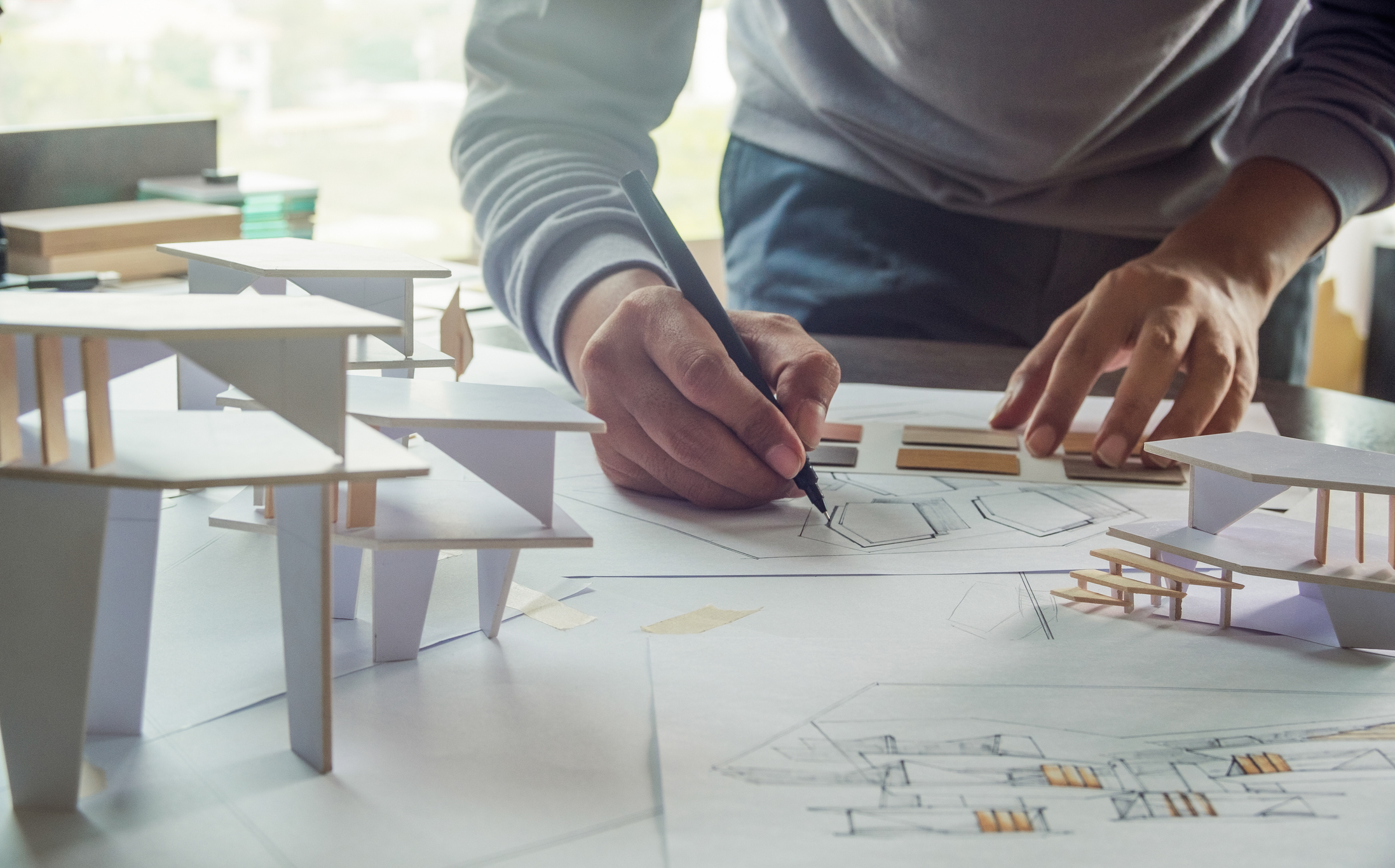Architect Recommended Apps for 3D Modeling
Architect Recommended Apps for 3D Modeling
Blog Article
Discover the Crucial Skills and Top Qualities Every Architect Must Have
As an architect, you understand that success in your area surpasses simply technical skills. It has to do with blending creativity with usefulness, cultivating partnership, and handling jobs properly. Each quality plays a critical duty in your ability to create areas that motivate and work well. Yet what are the particular abilities that can truly establish you apart? Let's check out the vital attributes every Architect must grow to grow in this ever-evolving career.
Imagination and Technology
Creativity and innovation are at the heart of architecture, driving the style of rooms that motivate and work effortlessly. You'll frequently discover new materials, strategies, and technologies to improve your layouts.
You'll also attract motivation from numerous resources-- nature, art, and even daily life can stimulate fresh concepts. This capability to mix creativity with usefulness enables you to attend to complicated troubles, ensuring your designs satisfy both functional and visual needs.
Strong Interaction Skills
While developing remarkable spaces calls for creative thinking, strong interaction abilities are just as critical for architects. You require to communicate your ideas plainly to customers, service providers, and staff member. Listening is equally as vital; understanding your customer's vision aids you develop layouts that absolutely fulfill their demands.
You'll commonly need to clarify complex ideas in a means that's very easy to comprehend, whether you're providing a proposal or reviewing products. Reliable interaction fosters collaboration, making sure everyone is on the exact same web page throughout the project.
Building partnerships is crucial, too. When you establish trust fund and rapport, customers are extra most likely to share their issues and comments, leading to much better end results.
Finally, do not underestimate the power of body movement and aesthetic help. They can improve your message and make your presentations much more interesting. Strong communication abilities not just elevate your layouts however likewise enhance your specialist relationships in the building globe.
Technical Proficiency in Design Software
As you browse the ever-evolving globe of design, understanding style software ends up being important for equating your creative ideas right into concrete strategies. Familiarizing yourself with programs like AutoCAD, Revit, and SketchUp will certainly not just boost your design abilities yet likewise simplify your process. These tools permit you to develop in-depth drawings, 3D models, and even simulations that can aid you visualize and provide your concepts better.
Exceling in these software application applications additionally boosts your cooperation with professionals and designers, as everyone can function from the very same electronic foundation. Additionally, your ability to adapt to new modern technologies will keep you competitive in the area. Routinely upgrading your abilities and checking out new features can establish you in addition to your peers, guaranteeing your designs are exact and innovative. Inevitably, technical proficiency in style software application is a cornerstone of successful style, assisting you bring your visions to life.
Recognizing of Design Principles

Recognizing design principles also enables you to prepare for prospective obstacles early in the layout process. You can make enlightened selections that improve your styles when you're aware of just how different products act under various problems. Your styles should not only be aesthetically pleasing but lasting and likewise useful.
Additionally, a strong understanding of engineering principles permits you to innovate within constraints. You can press innovative limits while still adhering to security standards. Inevitably, this understanding enriches your architectural technique and sets you apart in an affordable area.
Task Management Talents
Effective task management capabilities are important for designers, allowing you to manage all facets of a task from conception to conclusion. You'll require to coordinate with different stakeholders, including clients, specialists, and designers, making certain everybody's on the exact same page. Establishing clear objectives, timelines, and spending plans is fundamental; it assists you maintain the job on track and within range.
As an engineer, you ought to likewise be skilled at risk administration, identifying possible issues prior to they rise. Solid communication abilities are essential, allowing you to verbalize your vision and inspire your team. You'll benefit from being organized and detail-oriented, as this aids improve procedures and prevent pricey delays.
Furthermore, versatility is crucial; jobs typically evolve, and being versatile enables you to react efficiently to modifications. Eventually, your project monitoring skills can greatly affect the success of your architectural endeavors, guaranteeing you provide high quality results in a timely manner and within spending plan.
Attention to Information
While taking care of projects is necessary, your interest to information can make a significant difference in the high quality of your work. Every line you attract, every product you choose, and every small spec you note adds to the overall success of a project. You need to be meticulous, making sure that your layouts not only meet visual requirements but also abide by developing guidelines and codes.
Missing out on also a small detail can bring about expensive modifications or safety and security issues down the line. By cultivating an eager eye for detail, you boost your capability to find prospective troubles prior to they intensify. This watchfulness not only conserves you time and resources however also constructs your credibility as a dependable Architect. Bear in mind, it's typically the smallest details that boost a job from great to remarkable. Welcome this ability, and let it direct your layout procedure, making certain that your vision is implemented faultlessly.
Versatility and Problem-Solving Abilities
As a designer, you'll usually encounter unexpected adjustments in design and task demands. Your capacity to welcome these changes and locate ingenious solutions is necessary for success. Remaining adaptable in your method not just boosts your problem-solving abilities however likewise keeps your jobs on course.
Welcoming Change in Design
Accepting change in style is click here crucial for designers, specifically when guiding advancing customer requirements and arising innovations. You need to grow flexibility, as projects usually move more info direction based upon brand-new understandings or restrictions. Being open to alter allows you to check out innovative methods and develop services that reverberate with your clients.
When confronted with difficulties, your problem-solving abilities enter play. You'll frequently need to rethink principles and readjust intend on the fly, making sure that the last end result aligns with the client's vision while satisfying safety and regulatory criteria. By being versatile and resourceful, you not just enhance your styles but additionally develop count on with your clients, confirming that you can browse the complexities of modern design efficiently.
Cutting-edge Solutions to Obstacles

Flexibility in Project Monitoring
While navigating the complexities of task management, adaptability becomes an important property for architects. You'll commonly face unanticipated obstacles, from layout adjustments to budget plan restrictions, needing quick thinking and versatility. Welcoming adjustment permits you to pivot your techniques and discover innovative solutions, guaranteeing project success.
Solid analytic abilities are important; they allow you to evaluate circumstances, evaluate alternatives, and implement efficient services on the fly. When working with diverse groups, being open to feedback and different concepts promotes partnership and sparks creative thinking.
Often Asked Questions
What Educational Background Is Needed to Come To Be a Designer?
To end up being an architect, you'll require at the very least a specialist level in architecture, usually a Bachelor's or Master's. Obtaining and finishing a teaching fellowship licensure through tests is vital for your career development.
Exactly How Vital Is Networking in the Style Field?
Networking's crucial in style. It aids you construct relationships, uncover job chances, and gain understandings from seasoned specialists. By getting in touch with others, you boost your occupation prospects and remain upgraded on sector patterns and developments.
What Are the Common Profession Paths for Architects?
Usual job courses for get more info architects include design functions in companies, project monitoring, city planning, and specialized areas like lasting design. Architect. You might likewise discover mentor or consulting, depending on your interests and experiences
Just How Can Designers Stay Updated With Industry Trends?
To remain upgraded with sector trends, you must consistently go to seminars, join expert associations, register for appropriate magazines, and involve with on-line forums. Connecting with peers additionally aids you acquire understandings right into emerging advancements in design.
What Function Does Sustainability Play in Modern Style?
Sustainability forms modern-day design by stressing energy effectiveness, source preservation, and environmentally friendly materials. You'll produce areas that minimize ecological influence, boost passenger well-being, and react to climate challenges, making your layouts much more impactful and relevant.
While creating impressive rooms needs creative thinking, strong communication skills are simply as essential for designers. Solid communication abilities not only boost your styles yet likewise strengthen your expert connections in the building globe.
Effectiveness in style software program lays the groundwork for a deeper understanding of design concepts, which is essential for architects.As an architect, you'll typically face unforeseen changes in layout and job demands.Accepting change in design is vital for architects, particularly when steering advancing customer needs and emerging innovations.
Report this page